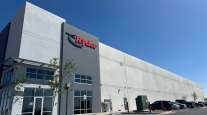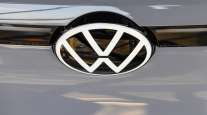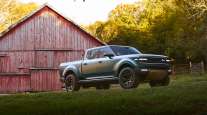Staff Reporter
EV Manufacturer Revoy Unveils Ryder as First Customer
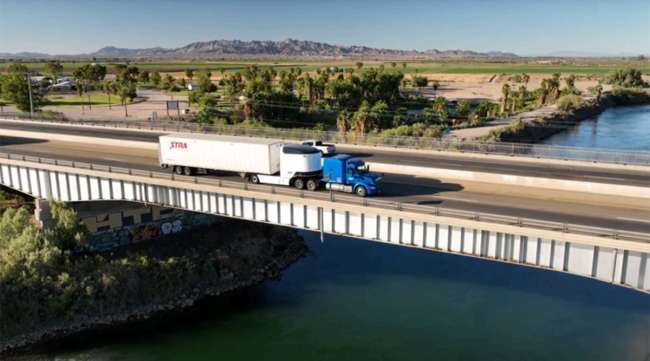
[Stay on top of transportation news: Get TTNews in your inbox.]
Revoy revealed Ryder System as the first customer for the Bay Area startup’s electric vehicle, which converts a Class 8 diesel semi into a hybrid without any changes to the tractor.
Leasing and logistics giant Ryder is using three Revoy EVs commercially on part of its longhaul Interstate 30 lane between Memphis, Tenn., and Laredo, Texas, Revoy CEO Ian Rust told Transport Topics. Ryder began pilot testing in December 2023.
Ryder’s trucks become hybrid vehicles between Prescott, Ark., and Dallas swapping stations. “This is partial lane electrification, which is different from other EVs. You don’t need to electrify the whole highway,” said Rust, adding that extending the lane in the future was likely.
The kingpin of the Revoy vehicle connects to a tractor’s fifth wheel, while the fifth wheel of the add-on unit connects to the kingpin of a trailer so that the whole truck becomes a hybrid vehicle.

Rust
Sensors mirror the driver’s actions. There is no communication with the truck, with the EV detecting the direction the tractor is moving. Swapping out the Revoy EV in Prescott or Dallas takes four minutes, Rust said.
Revoy’s EV improves fuel efficiency to 20 to 35 mpg from 6 to 8 mpg, representing a 70-90% or more reduction in emissions, according to the company.
“This is a way we can reduce a path to reduce the emissions of our fleet without having to buy anything — and without having to have to worry about how much utilization we’re going to have to get,” Mike Plasencia, group director of new product strategy at Ryder, said.
Revoy supplies the EV and the swapping stations and customers like Ryder pay Revoy a fee. As Rust told TT in February: “We’re essentially selling fuel. [Customers] essentially pay us per mile.”
Ryder plans to introduce thousands of electric vehicles to its fleet, but executives at the Miami-based company — which ranks No. 6 on the Transport Topics Top 100 list of the largest for-hire carriers in North America and No. 8 on the TT Top 100 logistics list — have been skeptical about the costs and infrastructure requirements.
In May, Ryder CEO Robert Sanchez told attendees of the ACT Expo 2024 conference in Las Vegas that battery-electric trucks had only evolved as far as brick-style cellphones seen in the 1980s.
Waving a 2½-pound Motorola DynaTAC 8000X “brick” phone, Sanchez said the current BET models must take technological leaps similar to those that carried mobile devices from bricks to smartphones.
And analysis by the leasing and logistics specialist in May indicated that the business case for swapping a diesel or gasoline truck for an EV is shaky for much of the trucking industry.
Revoy’s fee-based remuneration system obviates the upfront cost expenditure typically required to start building an EV fleet as well as the requisite infrastructure.
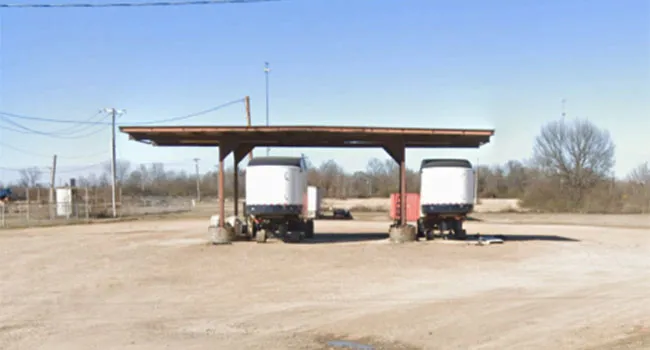
A Revoy swapping station. (Revoy)
The Revoy EV Ryder is using is a fifth-generation product, and capabilities will be enhanced yet further with a sixth-generation model in 2025.
Revoy is working on that next iteration of the vehicle. The upcoming version will begin testing before the end of 2024, said Rust, and will have a larger powertrain. Rust expects the next generation of Revoy EVs to be used in a pilot program in Washington state in 2025.
The next trial with a potential customer is set to be in Washington state in the second quarter of 2025, the company’s top executive said, adding that further pilot testing is scheduled for south Texas around the same time frame.
Revoy has two swapping stations, which are in use by Ryder, and plans to build swapping stations in Washington and Texas for the 2025 pilot programs.
Rust said Revoy avoids the chicken-and-egg situation that many charging infrastructure developers find themselves in by providing both the EV and swapping stations.
Want more news? Listen to today's daily briefing below or go here for more info:


